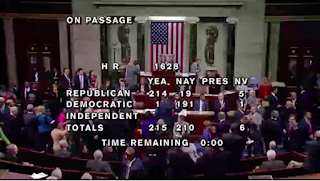The American Health Care Act ("AHCA") is not the law of the land...but rather it still is the Affordable Care Act ("ACA") governing our nation's healthcare framework. Let’s preface this fact with the message advocates have been stumping for months: stay vigilant, stay active, and stay on top of your elected representatives. For policy “wonks” and advocates assessing how potential legislation affects the American public, policy impact matters just as much as the political environment.
The American Health Care Act passed the U.S. House of Representatives on the narrowest of margins at 217-213. Twenty Republicans voted “no” on deep concerns of both negative impact on access and quality of care, and due to their seats being vulnerable in the 2018 midterm election (Roll Call, 2017). This vote took three months, one failed vote earlier this year, and days of “arm twisting in the cloak room” to make it happen. For the culture of the House, it is somewhat extraordinary in modern times. Now the legislation rests in the hands of the U.S. Senate.
 |
| Photo Source: C-SPAN |
The Senate, while subject to more of the weight of Presidential politics, is a different beast entirely (Washington Post, 2017). Presidential politics plays both in favor for those Senators aligned with the President and against those from contentious states due to vulnerability of the seats. With a narrow Republican majority in the Senate, the coming months will see the divisions of the House amplified and thus weakening the possibility of the AHCA in its current form (or any form for that matter) passing the Senate. Additionally, once a Congressional Budget Office “score” is available, the Senate parliamentarian must assess if the bill meets the requirements of the “Byrd rule” as the AHCA is a “reconciliation” measure. Amendments added to the bill as it moves through the Senate committees will further change the CBO score and may make passage even less likely.
Among topics of concern with the bill are popular ACA provisions like consumer protections regarding pre-existing conditions, annual and lifetime limits, and the ability for children to stay on their parents’ coverage until the age of twenty-six. Less popular, though still maintaining wide support is the Medicaid expansion. The AHCA weakens these provisions by giving states the option to “opt out” of Essential Health Benefits, attacking Community Health Ratings, and forming “risk pools” for people with pre-existing conditions. Of note, independent analysis has shown that to adequately fund state risk pools, the AHCA would need to provide for $25 billion of funding. Currently, the AHCA only offers $8 billion over the course of 5 years. The ACA provided for $5 billion and ran out of funds at the 3rd year. The AHCA also structures “punishments” for those who experience lapses in coverage and older Americans. Combining these facts with substituting current subsidies with tax credits, people will face greater likelihood of lapse in coverage and increases in rates due to being unable to afford coverage in the first place. All while cutting funding and adding caps to state Medicaid programs.
Medicaid funding cuts are of special note as Medicaid expansion has eased the burden of other assistance programs like state AIDS Drug Assistance Programs, shortening waiting lists for services, and providing direct and continuous care opportunities for the most vulnerable of the American public.
The aforementioned issues will continue to be the center of the debate on the AHCA and why the CBO has scored the AHCA to cause tens of millions to lose coverage over projected 10 years following implementation.
Differing views in the Senate that label the health care programming and policy as “entitlement” will compete strongly with the attitudes of moderate Republicans that the government should provide protections and an avenue of care for their constituents and consensus will be exceptionally difficult to find. What’s likely to bring moderates on board will alienate Libertarian-minded Republicans, and vice versa. Democrats are expected to behave as a “blue wall” and vote as a caucus against the AHCA. The two Democrat Senators to watch will be Joe Manchin (WV) and Heidi Heitkamp (ND), as the most likely to indicate if the AHCA may gain even a single blue vote and thus is altered enough to gain a moderate majority.
 |
| Photo Source: trofire.com |
The best way for constituents and advocates to make their voices known is, and will always be, to call their elected representatives offices, both at home and in DC, show up to town hall meetings, and take action with advocacy organizations aligned with their values.
You can find your Representative’s contact information here: http://www.house.gov/representatives/find/.
You can find your Senator’s contact information here:
https://www.senate.gov/senators/contact/.
Disclaimer: Guest blogs do not necessarily reflect the views of the ADAP Advocacy Association, but rather they provide a neutral platform whereby the author serves to promote open, honest discussion about public health-related issues and updates.

No comments:
Post a Comment